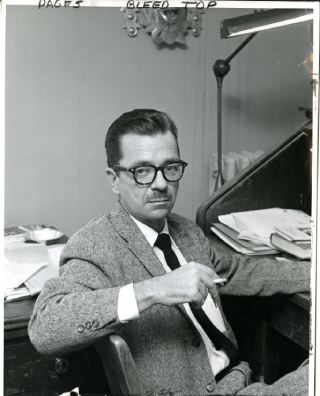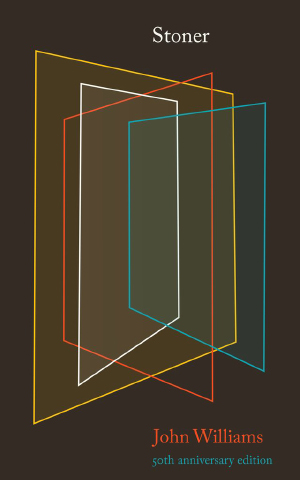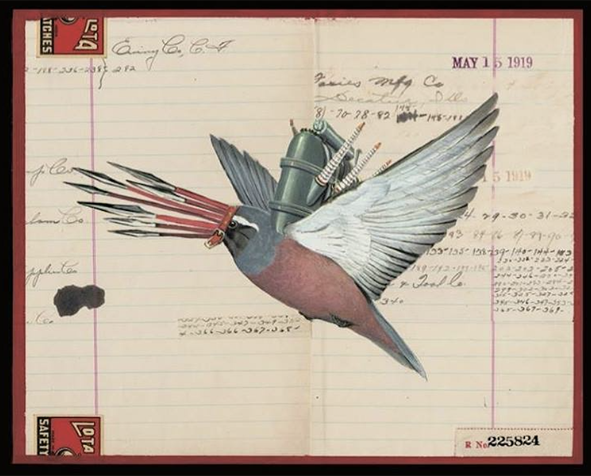Q&A: Denver Quarterly Celebrates Its 55th Anniversary
Collections & Archives
Founded by novelist John Edward Williams in 1966, Denver Quarterly is the oldest, continuously publishing literary arts journal west of the Mississippi. As of the fall of 2021, the journal is celebrating its 55th anniversary by revisiting their 1986 John Williams special issue that included a significant excerpt from his unfinished novel, “The Sleep of Reason,” which has not yet appeared elsewhere. Ahead of publication, we talked with the journal’s editor-in-chief, W. Scott Howard, to learn more about these plans.
What should readers be excited to see in this special edition of Denver Quarterly?
Our forthcoming issue, 56.1, will include a reprint of the excerpt from Williams’s “The Sleep of Reason” that we originally printed in 1986. During Williams’s lifetime, he published two excerpts from that work: first in Ploughshares (1981), then in Denver Quarterly 20.3. Between those two excerpts, ours represented the more substantial portion. Our 1986 John Williams issue sold out long ago, so our forthcoming issue (fall 2021) will make this valuable work available once more. In addition to this new edition of Williams’s text, 56.1 will also include three essays discussing his life and works: one from me that reckons with Williams’s legacy within and against the contexts of his years at DU and our journal’s current editorial policies and practices; and one each from established Williams scholars, Anne Marie Candido and Alan Prendergast. These new essays sharpen our understanding of Williams’s writing practice and of his personal struggles with the academic and literary establishments of his day.
For those unfamiliar, who is John Williams and why is there a growing interest in his literary works some 30–40 years later?
John Edward Williams (August 29, 1922–March 3, 1994) grew up in Clarksville and Wichita Falls, Texas. His grandparents and parents were farmers; his stepfather, a post-office janitor. He graduated from Wichita Falls Senior High School in 1939. In 1942, Williams enlisted in the Army Air Corps, serving for two and a half years as a radio operator on C-47 surveillance flights over China, India and Burma. After the war, he resumed his studies with support from the G.I. Bill. Williams graduated from the University of Denver with a Bachelor of Arts (1949) and a Master of Arts (1950), then enrolled in a doctoral program at the University of Missouri, where he taught, graduating with a PhD in 1954. He returned to DU that August as an assistant professor, thereafter teaching, serving as director of our creative writing program, and completing the books for which he would become renowned: “Butcher’s Crossing” (1960), “Stoner” (1965) and “Augustus” (1972). The 1973 National Book Award for Fiction was awarded to John Williams (for “Augustus”).
In addition to these novels, Williams also published two books of poetry — “The Broken Landscape” (1949) and “The Necessary Lie” (1965) — one anthology, “English Renaissance Poetry: A Collection of Shorter Poems from Skelton to Jonson (1963),” numerous essays and scores of poems in journals and anthologies. Williams co-founded, with Gerald (Jerry) Chapman, the University’s literary journal, Denver Quarterly: A Journal of Modern Culture, serving as editor-in-chief for eighteen issues through 5.2 (1970). He retired from DU in 1985.
The revival of interest in Williams’s writings was boosted in 2016 when “Stoner” was republished in a 50th-anniversary edition from the New York Review of Books. Emma Straub called it the “most beautiful book in the world.” A 2007 New York Times essay extolled “Stoner” as “a perfect novel, so well told and beautifully written, so deeply moving, that it takes your breath away.” In Britain, “Stoner” became Waterstones’ 2013 Book of the Year. Translations appearing in France (2013) and in the Netherlands (2015) sparked an international storm of interest magnified by increasing availability and appreciation of Williams’s works. The NYRB series of “overlooked” classics also includes “Butcher’s Crossing” (2007), “Augustus” (2014) and “Nothing But the Night” (2019). Later this year, the Library of America will publish “Butcher’s Crossing,” “Stoner” and “Augustus” together in one volume; and Williams will be inducted into the Colorado Authors’ Hall of Fame. Major motion picture adaptations of “Stoner” and of “Butcher’s Crossing” are in-progress.
What makes “The Sleep of Reason” so interesting?
“The Sleep of Reason” revisits Williams’s experiences during WWII that haunted him for the rest of his life, thereby circling back to his work on “Nothing But the Night,” which he began writing after surviving the crash of his C-47 that was shot down over Burma, killing five of the eight men on board. The work’s title refers to Francisco Goya’s 1799 aquatint, “The Sleep of Reason Produces Monsters.” Williams was writing “The Sleep of Reason” during 1980–1989, which were difficult years due to his declining health. He hoped that “The Sleep of Reason” would be his masterpiece. The work is semi-autobiographical. Charles Shields’s biography of Williams, “The Man Who Wrote the Perfect Novel” (University of Texas, 2018), describes the context:
“The setting is Washington, D.C., during the Nixon years. The central figure is Paul Mathews, in his middle fifties, a senior curator of the paintings in a small but distinguished Washington museum. As a 19-year-old corporal during World War II, he had been captured by the Japanese in Burma and held prisoner for several months. It was a period he tries not to think about” (235).
Williams completed a draft of around 100 pages, representing the novel’s first three chapters. On March 29, 1986, DU hosted a one-day conference honoring Williams that was sponsored by Denver Quarterly and The Colorado Endowment for the Humanities. That night, in the Western History Room at Denver Public Library, Williams read from his typescript for 40 minutes before an audience of at least 100 invited guests.
How does your new Williams portfolio align with the journal’s commitment to publishing avant-garde works?
We are known for publishing works that limn the edges of experimentation and that play thoughtfully with convention. That ethos may be found in our myriad pages since our journal’s first issue (spring 1966). And yet, because so much has changed since then, this new collection of selected Williams materials blends the work of remembrance with that of reckoning. Williams’s acclaimed novel, “Stoner,” contains deeply problematic elements that must be critically engaged. Our 55.5 portfolio affirms the incisive arguments of Elaine Showalter (2015) and Katharine Coldiron (2018) that confront sexism, racism and ableism at the core of “Stoner’s” narrative structures. Their compelling critiques underscore our journal’s commitment to diversity, equity and inclusion that requires ongoing activism on all levels in our community.
Where can people find or purchase Denver Quarterly 56.1 (2021)?
Denver Quarterly may be found via our website, Instagram, Twitter, Submittable and our electronic journal, FIVES: a companion to Denver Quarterly. Individual issues of Denver Quarterly, which we publish in hard copy, may be purchased via independent bookstores.
Readers may contact us at Denver Quarterly, Department of English & Literary Arts, 495 Sturm Hall, University of Denver, 2000 E. Asbury Ave., Denver, CO 80208. Our parent organization, the University of Denver, is a registered US 501(c)(3) public charity. We welcome donations to our gift fund that supports our strategic initiatives, including our public events in solidarity with Black Lives Matter and our annual prizes for the best works of poetry, prose and translation, each accompanied by a $200 cash award, and each recognizing works published in Denver Quarterly during the previous year.







